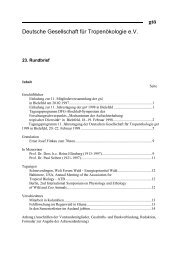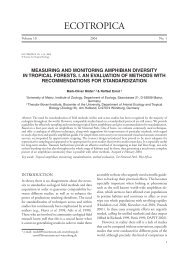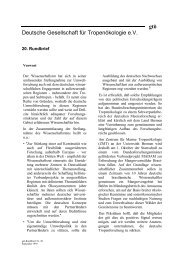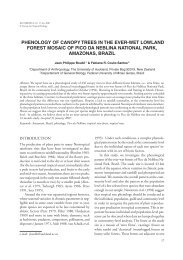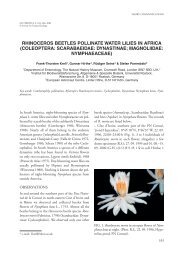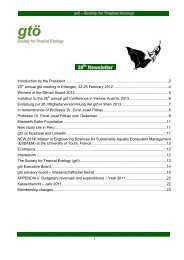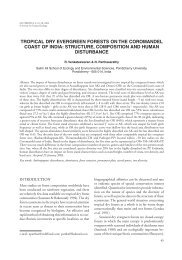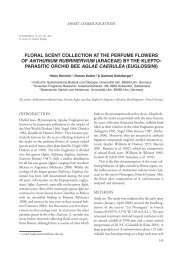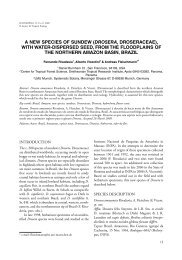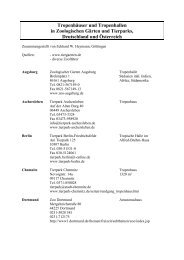Abstract booklet - gtö – Society for Tropical Ecology
Abstract booklet - gtö – Society for Tropical Ecology
Abstract booklet - gtö – Society for Tropical Ecology
Create successful ePaper yourself
Turn your PDF publications into a flip-book with our unique Google optimized e-Paper software.
164 PARALLEL SESSION HALL H IV THURSDAY LINK FOR SURVIVALPARALLE SESSION THURSDAY H III: LINK FOR SURVIVAL165Parallel session, Thursday, 24 February, 15:45, Hall H IVSession: Link <strong>for</strong> survival - Science and the conservation of tropicallandscapesHOW TO ESTIMATE THE CONSERVATION STATUS OF VASCULARPLANTS IN A SMALL SCALE AREA? A CASE STUDY IN EAST AFRICANRAIN FORESTSKatja Rembold 1 , Eberhard Fischer 1Parallel session, Thursday, 24 February, 16:30, Hall H IV:Link <strong>for</strong> survival - Science and the conservation of tropical landscapesTHE CUTTING EDGE OF SUSTAINABILITY: EXPLORATIONS OFAMPHIBIAN FUNCTIONAL DIVERSITY IN SELECTIVELY LOGGEDSILVICULTURAL SYSTEMS OF THE GUIANA SHIELDMonique Hölting 1 , Raffael Ernst 11Senckenberg, Dresden, DE, monique.hoelting@tu-berlin.de1University of Koblenz, Koblenz, DE, rembold@uni-koblenz.deTHURSDAY 15:45 Hall H IVWith the objective of establishing an ex-situ conservation collection of vascularplants from East African rain <strong>for</strong>ests, we first had to investigate the concernedspecies and assess their conservation status. Two model <strong>for</strong>ests were selectedwhich provide the full range from primary <strong>for</strong>est to young secondary <strong>for</strong>estunder different anthropogenous and ecological pressures: Budongo Forest inUganda and Kakamega Forest in Kenya. To find out which plant species occurin our study area in what abundance and under which conditions vegetationmapping was carried out along a disturbance gradient.The IUCN provides an excellent classification scheme which is very useful toestimate the global conservation status of organisms. Considering a small scalearea some points of the IUCN classification scheme lapse while others can beexamined in more detail and new aspects can be included (e.g. ecologicalinteractions between organisms). Basing on this field observations as well asliterature data and in<strong>for</strong>mation provided by the local people, we developed asmall scale classification scheme which enables us to give evidence about theconservation status of each plant species in our <strong>for</strong>ests.The predominant use of tropical <strong>for</strong>est as a source <strong>for</strong> timber is causing highpressure on these complex ecosystems. Even though in the past Guyana, whichharbours the anchor site of our study, has had among the lowest de<strong>for</strong>estationrates of the world,13.5 of its approximately 15 million ha of rain<strong>for</strong>est is classifiedas state <strong>for</strong>est and thus potentially open to logging. Only little is known aboutthe actual affect of logging on complex <strong>for</strong>est ecosystems and whethersustainable <strong>for</strong>estry can be an adequate strategy to mitigate possible negativeimpacts. Our study aims to fill that gap by resolving interactions betweendifferent levels of biodiversity and ecosystem functioning in a region that issubject to selective sustainable silviculture. We use amphibian communities asa suitable and sensitive organismic model that allows the analysis of diversitypattern changes at different levels.The main study is being conducted within a controlled polycyclic timberharvesting scheme implemented by our project partner Iwokrama InternationalCentre <strong>for</strong> Rain<strong>for</strong>est Conservation and Development under the auspicesof Forest Stewardship Council (FSC). These circumstances put us into theexceptionally rare position of conducting true pre-and post impact studiesthat allow linking impacts, effects and underlying processes at the ecosystemfunctioning level in a direct manner. We hope to analyze anthropogenic driversof amphibian diversity loss in the tropics in order to help improving conservationactivities and harvesting guidelines of selective logging operations. Thepresentation provides insights into the first results of the field work conductedin 2009 and 2010.THURSDAY 16:30 Hall H IVgtö<strong>Society</strong> <strong>for</strong> <strong>Tropical</strong> <strong>Ecology</strong> | Gesellschaft für Tropenökologie e.V. Status and future of tropical biodiversity | Frankfurt, 21 - 24 February 2011gtö



